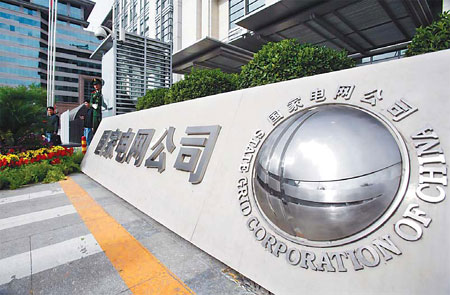State Grid issues guidelines for CSR
By Liu Jie (China Daily)
2009-03-23 07
|
|
|
The State Grid Corporation of China logo is seen in front of the company's headquarters in Beijing. State Grid was the first Chinese enterprise to formulate the corporate social responsibility report in China in 2005. [Photo/Asianewsphoto] |
State Grid Corporation of China (SGCC), the first Chinese enterprise to formulate a corporate social responsibility (CSR) report in 2005, took the lead again in recently issuing a Guidance for the Implementation of CSR, thoroughly illustrating how the State-owned enterprise fulfills its social responsibilities.
In accordance with the requirements stipulated in the Guidance, all SGCC departments and subsidiaries shall motivate employees to consciously fulfill CSR requirements in daily work, improve the implementation of CSR, promote sustainable development, and maximize the company's comprehensive value in economic, social and environmental aspects.
The Guidance details SGCC's CSR strategy, which involves incorporating CSR into the corporate mission and culture, actively upholding eight fundamental principles, introducing CSR performance assessment, encouraging stakeholders' participation and arranging a CSR information disclosure mechanism and CSR index system.
The eight fundamental principles must be followed by each division of the grid group.
First, the principle of complying with laws and regulations means that the company and employees voluntarily abide by national laws and regulations, follow international conventions and practices recognized or approved by the government, and observe social morality, business ethics, corporate commitments and regulations. This is the fundamental requirement of CSR implementation.
The second principle is honesty and integrity. Employees shall follow SGCC's Code of Conduct, observe internal regulations of the 10 Promises on Power Supply Service, 10 Measures for the Open, Fair and Just Power Dispatching, 10 Prohibitions against Employee Misbehavior, and build up the brand image of the company.
The principle of being human-oriented means that SGCC takes into full consideration the expectations of stakeholders and requirements for sustainable development, gives full play to the initiative and creativity of employees and stakeholders and realizes the value of employees.
Regarding the principle of being transparent and open, the State-owned grid operator will, by means of system improvement and resource support, enhance information disclosure, motivate stakeholders' participation in sustainable development, and ensure stakeholders' right to know and participate. This principle is an important guarantee for the company to win the understanding and support of stakeholders.
SGCC will improve the information disclosure mechanism, channel and mode, persist in regular release of CSR reports, reveal accurate and complete information to stakeholders, and accept the supervision of the public. Furthermore, it is to improve the mechanism of stakeholders' participation, listen to the opinions and suggestions of stakeholders as well as strengthen the communication and cooperation with them.
The fifth principle of risk prevention means that the company and employees actively take prevention measures, manage potential risks in corporate development and avoid those actions and results that may affect sustainable development of the stakeholders, environment, company and society. The company shall enhance risk prevention awareness among employees, and regard it as an important principle in decision-making and routine work. Risk prevention is carried out in construction and operation of the power grid. Adverse impact on the environment and society should be mitigated to the highest possible extent.
| ||||
Through management and technical innovation, the grid behemoth is to meet the requirements for environmental protection and sustainable utilization of resources to ensure a safer, cleaner, more economical and more sustainable power supply.
Finally, the principle of creating value means the company views the realization of economic, social and environmental comprehensive value as the goal of CSR implementation. In other words, it aims to create value for investors and other stakeholders, attach importance to performance in financial, social and environmental aspects as well as ensure the benefits of this and future generations.
The pursuit of maximized comprehensive value is the basic requirement and guideline for CSR implementation. In accordance with it, SGCC is to adhere to the corporate tenet, improve all development areas such as corporate mission, development strategy, operational mode, performance appraisal, communication and optimized allocation of social resources, satisfy the needs of stakeholders, and enlarge the comprehensive value of the company.










